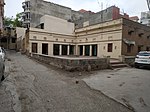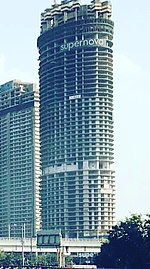The Shaheen Bagh protest was a peaceful sit-in protest in Delhi, India, that began on 15 December 2019 and lasted until 24 March 2020. The protest was led by women who blocked a major road at Shaheen Bagh using non-violent resistance 24×7. Mainly consisting of Muslim women, the protest began in response to the passage of the Citizenship (Amendment) Act (CAA) on 11 December 2019 and the ensuing police intervention against students at Jamia Millia Islamia who were opposing the Amendment. Protesters agitated against the citizenship issues of the CAA, National Register of Citizens (NRC) and National Population Register (NPR), in addition to police brutality, unemployment, and poverty, and for women's safety. The Delhi Police barricaded major roads in and around the area, affecting more than 100,000 vehicles a day and adding hours to some journeys. Following the North East Delhi riots, police presence in the area temporarily increased with over 1000 personnel being assigned to Shaheen Bagh. After the COVID-19 outbreak in India and subsequent government-enforced restrictions the protest continued for several days in a more controlled manner. Following the complete lockdown imposed in Delhi on 23 March 2020, the remaining protesters were arrested or forcefully removed from the site by the Delhi Police.
The barricaded and tented venue drew large crowds with tens of thousands of protesters participating. Some days saw over 150,000 at the venue. The protest inspired similar copycat protests across the country, such as those in Gaya, Kolkata, Prayagraj, Mumbai and Bengaluru. The leaderless protest became politicized and was generally against the Bharatiya Janata Party (BJP) government. The blockade became a campaign issue in the 2020 Delhi Legislative Assembly elections, especially for the BJP. BJP's campaign was negative towards the Shaheen Bagh protests with a number of campaigners making controversial statements such as "goli maaro" (English: Shoot them). Some BJP campaigners promised to immediately remove the blockade after being voted into power and were accused by their opponents of prolonging the demonstration to agitate voters. BJP won an extra six seats as compared to the last election while Aam Aadmi Party retained a clear majority with 62 seats.
A number of petitions were filed to stop the blockade. The Delhi High Court refused to hear the first two pleas and on 14 January 2020 declared the blockade to be a police matter. The Delhi Police said that they would not use force to end the blockade. A third petition highlighted the difficulty faced by students with upcoming board examinations. The matter reached the Supreme Court of India, which appointed three mediators to initiate conversations with the protesters regarding shifting to a location which wouldn't block a public place. In response to the batch of petitions filed against the protestors, the Supreme Court of India stated on 7 October 2020 that the "indefinite" occupation of public space for protest or expressing dissent was not acceptable.
One of the Shaheen Bagh protestors, 82-year old Bilkis, was listed in Time magazine's 100 most influential people of 2020, BBC's 100 Women and was also named as the 'Women of the Year' in the 2021 edition of The Muslim 500. Delhi Police labelled Sharjeel Imam as one of the 'masterminds' of the protest. While the protest was praised for a number of reasons some commentators called it a failure with regard to the main goal of revoking CAA.







